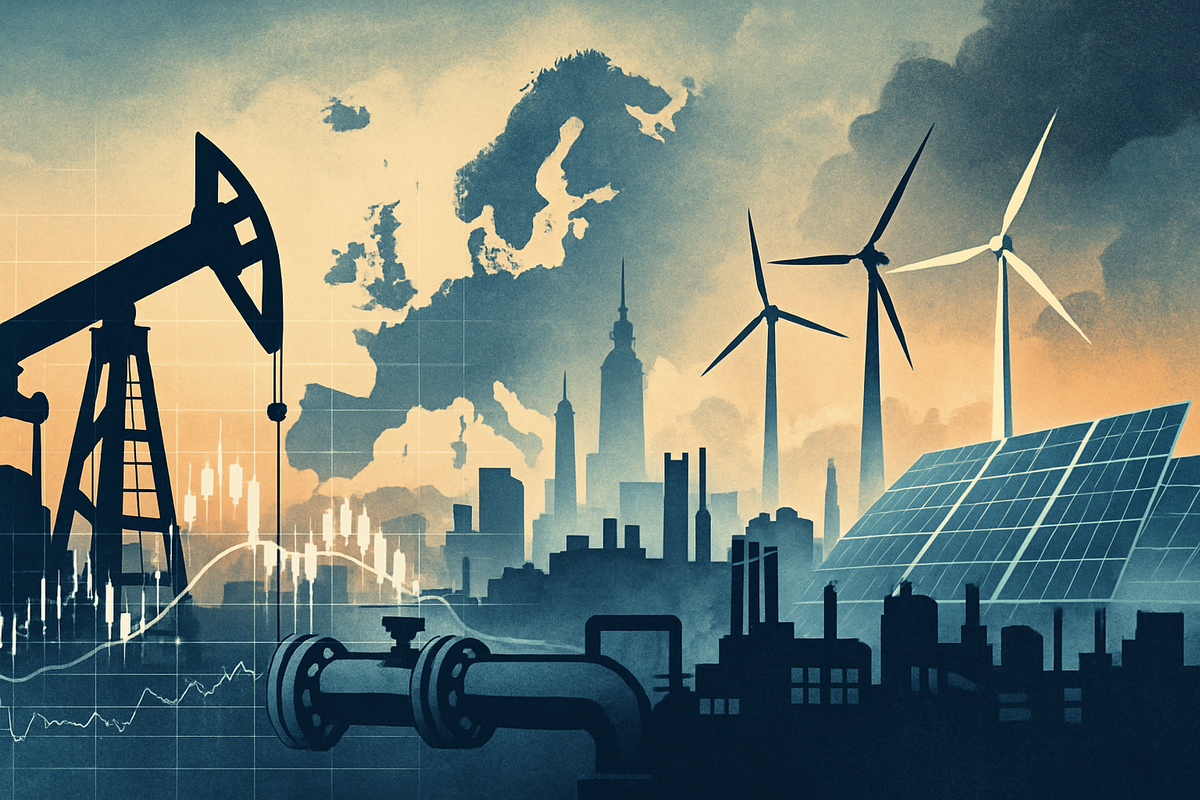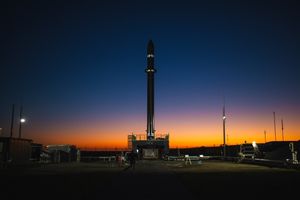
The Vanguard FTSE European ETF (NYSEARCA: VGK), a cornerstone for investors seeking broad exposure to developed European equity markets, finds itself at a critical juncture. With Europe's economy deeply intertwined with global commodity cycles, VGK's significant, albeit diversified, exposure to commodity-sensitive sectors presents a complex risk profile. This article delves into VGK's inherent risks, particularly its susceptibility to commodity price fluctuations, and benchmarks its standing against key peers amidst an evolving geopolitical and economic landscape.
In a world still reeling from the aftershocks of the European energy crisis and ongoing geopolitical tensions, understanding the nuances of an ETF like VGK becomes paramount. While offering broad diversification across sectors and countries, VGK's holdings in Basic Materials, Energy, and indirectly, Industrials and Utilities, mean that swings in the prices of oil, natural gas, and industrial metals directly influence its performance. As of October 17, 2025, with Brent crude at approximately $61.10/barrel and European benchmark gas at 32.29 euros/MWh, the commodity market remains a dynamic force shaping the fortunes of European corporations and, by extension, the ETF.
Unpacking VGK's Commodity Sensitivity in a Shifting European Market
The Vanguard FTSE European ETF (NYSEARCA: VGK) is meticulously designed to track the performance of the FTSE Developed Europe All Cap Index, encompassing a vast array of large-, mid-, and small-cap stocks across developed European nations. Its passive management strategy aims for minimal tracking error, yet its underlying holdings dictate its true risk landscape. VGK's sector allocation reveals its direct and indirect ties to commodity markets. While direct exposure via the Basic Materials sector stands at approximately 5.03-5.07% and Energy at 4.25-4.52%, the broader impact extends through other significant allocations. Industrials, accounting for over 20% of the portfolio, are heavily reliant on stable and affordable raw material and energy inputs, making them particularly vulnerable to price shocks. Similarly, the Utilities sector (around 4%) is acutely sensitive to natural gas prices, which often dictate wholesale electricity costs across the continent.
The timeline of events leading to the current commodity-sensitive environment for European equities is critical. The most impactful catalyst was the Russia-Ukraine War, which commenced in February 2022. This conflict instigated an unprecedented European energy crisis, as Russia drastically curtailed natural gas supplies, leading to price surges of approximately 180% in gas immediately following the invasion. Europe, historically dependent on Russian energy, was forced into a rapid and costly diversification of its energy sources, shifting towards more volatile global LNG markets. This structural change, further solidified by the cessation of pipeline gas supply from Russia through Ukraine in Q1 2025, has embedded higher and more volatile energy costs into the European industrial fabric. Key players include major European energy companies like Shell plc (LSE: SHEL) and TotalEnergies SE (EPA: TTE), industrial giants, and national utility providers, all navigating this new energy reality. Initial market reactions saw significant volatility, with energy-intensive sectors facing profitability pressures, while some energy producers benefited from elevated prices.
Beyond energy, other commodities have also played a role. The research indicates that as of October 17, 2025, LME three-month copper futures were at $10,621 per metric ton, reflecting ongoing industrial demand and supply considerations. Gold futures, rising to $4,320.30 per troy ounce, signal persistent safe-haven demand amidst broader equity market volatility. These figures underscore a continued environment where raw material costs remain a significant factor for European businesses.
Discerning Winners and Losers in the Commodity Crosscurrents
The intricate dance of commodity prices inevitably creates distinct winners and losers among the companies comprising the Vanguard FTSE European ETF (NYSEARCA: VGK) and the broader European market. Companies with significant upstream operations in the Energy sector, such as oil and gas exploration and production firms or integrated energy majors, often see their revenues and profits surge during periods of high commodity prices. For instance, BP plc (LSE: BP) and Equinor ASA (OSE: EQNR) would likely benefit from sustained higher oil and gas prices, improving their profitability and potentially increasing shareholder returns. Conversely, these companies face headwinds when commodity prices decline.
In the Basic Materials sector, which includes mining, chemicals, and construction materials, the impact is more nuanced. Producers of industrial metals like Rio Tinto plc (LSE: RIO) or chemical giants such as BASF SE (ETR: BAS) can benefit from strong demand and rising prices for their outputs, but they also face increased input costs for energy and other raw materials. Their ability to pass these costs onto consumers is crucial. Companies with efficient operations or proprietary technologies that reduce energy intensity might fare better. However, those heavily reliant on cheap energy or specific imported raw materials could see their margins squeezed.
The Industrials sector, a substantial portion of VGK's portfolio, is largely a net consumer of commodities. Heavy manufacturing, automotive, and aerospace companies, for example, face higher operational costs when steel, aluminum, or energy prices rise. Companies like Siemens AG (ETR: SIE) or Airbus SE (EPA: AIR) must manage these input costs effectively through hedging strategies, supply chain optimization, or by innovating towards less resource-intensive processes. Similarly, the Utilities sector, including firms like E.ON SE (ETR: EONGn) and Engie SA (EPA: ENGI), is directly impacted by natural gas and coal prices, as these often determine electricity generation costs. While some utilities can pass costs to consumers, regulatory caps or political pressure can limit this, affecting profitability. Companies with a higher proportion of renewable energy generation might be more insulated from fossil fuel price volatility.
Broader Significance: European Resilience and Strategic Shifts
The heightened commodity sensitivity of the European market, and consequently the Vanguard FTSE European ETF (NYSEARCA: VGK), is not an isolated incident but rather a critical reflection of broader industry trends and geopolitical realignments. The European energy crisis served as a stark reminder of the continent's vulnerability to external energy shocks, accelerating the push towards energy independence and renewable energy sources. This event has fundamentally altered investment priorities, with significant capital flowing into green energy infrastructure, energy efficiency technologies, and diversified energy supply chains. This trend positions companies involved in renewable energy development, such as Ørsted A/S (CPH: ORSTED) or Vestas Wind Systems A/S (CPH: VWS), for long-term growth, while traditional fossil fuel players face increasing pressure to transition their business models.
The ripple effects extend beyond direct energy and materials sectors. Supply chain resilience has become a paramount concern for European businesses. Companies across all sectors are re-evaluating their sourcing strategies, seeking to onshore or 'friend-shore' production to mitigate risks associated with geopolitical instability and long, complex global supply chains. This could lead to increased investment in European manufacturing capabilities, potentially benefiting domestic industrial and technology firms. Regulatory and policy implications are also profound. The European Union continues to push ambitious climate targets, with policies like the European Green Deal driving decarbonization efforts. These policies, while aiming for long-term sustainability, can impose significant compliance costs on commodity-intensive industries in the short to medium term. Historically, Europe has weathered several energy crises, but the current situation, marked by the explicit weaponization of energy by a major supplier, presents a unique challenge, necessitating deeper structural changes than previous episodes.
The Road Ahead: Adapting to Persistent Volatility
Looking ahead, the risk profile of the Vanguard FTSE European ETF (NYSEARCA: VGK) will continue to be shaped by the interplay of global commodity markets, geopolitical developments, and Europe's ongoing energy transition. In the short term, investors should anticipate continued volatility in commodity prices, influenced by factors such as global economic growth, supply disruptions, and the effectiveness of energy diversification efforts. Any escalation of geopolitical tensions, particularly in Eastern Europe or the Middle East, could trigger renewed spikes in oil and gas prices, impacting European industrial output and consumer spending. Conversely, a significant global economic slowdown could depress demand for industrial commodities, affecting basic materials and energy companies.
In the long term, the trajectory points towards a more diversified and potentially more resilient European energy landscape, albeit with lingering structural changes. The accelerated investment in renewable energy, nuclear power, and energy storage will gradually reduce Europe's reliance on imported fossil fuels, lessening the direct commodity sensitivity of its economy. However, the transition itself presents new challenges, including the need for critical raw materials for green technologies (e.g., lithium, rare earths), which could introduce new forms of commodity risk. Companies within VGK's portfolio will need to demonstrate strategic pivots, adapting to higher energy costs through efficiency gains, technological innovation, and a shift towards sustainable practices. Market opportunities may emerge in sectors supporting the green transition, such as renewable energy developers, electric vehicle manufacturers, and advanced materials companies. Challenges will persist for energy-intensive industries unable to adapt, potentially leading to consolidation or a shift in competitive landscape.
A Comprehensive Wrap-Up: Navigating Europe's Evolving Risk Landscape
In summary, the Vanguard FTSE European ETF (NYSEARCA: VGK) offers broad exposure to a developed European market currently undergoing significant structural shifts driven by commodity price volatility and geopolitical factors. While VGK benefits from extensive diversification across over 1,200 holdings and a low expense ratio of 0.06%, its inherent exposure to commodity-sensitive sectors—particularly Basic Materials (5.03-5.07%), Energy (4.25-4.52%), and indirectly, Industrials (over 20%) and Utilities (around 4%)—makes it susceptible to swings in global commodity markets. Compared to peers like the iShares Core MSCI Europe ETF (NYSEARCA: IEUR), VGK demonstrates similar risk/return characteristics and superior cost efficiency, while offering broader geographic diversification than the Eurozone-focused iShares MSCI Eurozone ETF (NYSEARCA: EZU).
Moving forward, the European market will continue to be influenced by the aftermath of the Russia-Ukraine war and the ongoing energy crisis. While commodity prices have moderated from their 2022 peaks, they remain elevated compared to pre-crisis levels, embedding higher input costs for many European industries. Investors should watch for continued geopolitical developments, the pace of Europe's energy transition, and the ability of key European companies to adapt to a higher-cost, more volatile commodity environment. The long-term significance of these events lies in the accelerated push for energy independence and sustainability, which will reshape industrial landscapes and create new investment opportunities and challenges. VGK's performance will be a bellwether for how effectively European companies navigate this complex and evolving risk landscape in the months and years to come.
This content is intended for informational purposes only and is not financial advice




